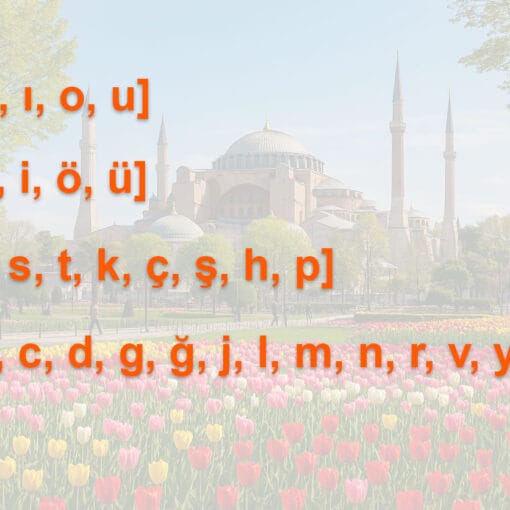İsim Cümleleri (Nominal Sentences) are nominal sentences in the Turkish language, meaning sentences without a verb-predicate in the form of an action. They are built around a noun, adjective, or pronoun, and express a state, characteristic, or possession.
In Turkish, nominal sentences can appear in the following forms:
- Affirmative form
- Negative form
- Interrogative form
- Negative-interrogative form
Affirmative form
Vowel Harmony (Büyük Ünlü Uyumu – Major Vowel Harmony)
In Turkish, suffixes must match the last vowel of the word. There are two types of vowels:
- Front vowels: e, i, ö, ü
- Back vowels: a, ı, o, u
The personal suffix must harmonize with the last vowel in the predicate noun or adjective.
Personal Endings in Affirmative Nominal Sentences
| Person | Suffix Options |
| Ben (I) | -im / -ım / -üm / -um |
| Sen (You) | -sin / -sın / -sün / -sun |
| O (He/She/It) | (no suffix) |
| Biz (We) | -iz / -ız / -üz / -uz |
| Siz (You plural) | -siniz / -sınız / -sünüz / -sunuz |
| Onlar (They) | (no suffix) — plural marker -ler/-lar only |
How to Choose the Correct Suffix
Look at the last vowel of the noun or adjective:
| Last vowel | Suffix vowel |
| a, ı | → -ı (e.g. yazım) |
| e, i | → -i (e.g. öğrenciyim) |
| o, u | → -u (e.g. mutlusun) |
| ö, ü | → -ü (e.g. dürüstüz) |
Examples
| Person | Turkish Sentence | Meaning (English) |
|---|---|---|
| Ben (I) | Ben öğretmenim | I am a teacher |
| Sen (You) | Sen öğretmensin | You are a teacher |
| O (He/She/It) | O öğretmen | He/She is a teacher |
| Biz (We) | Biz öğretmeniz | We are teachers |
| Siz (You plural) | Siz öğretmensiniz | You (pl.) are teachers |
| Onlar (They) | Onlar öğretmenler | They are teachers |
Note: The suffix is added according to vowel harmony rules.
In 3rd person plural (Onlar), the plural suffix -ler is used for clarity, though it’s not a verb suffix.
| Person | Example (Turkish) | Meaning (English) | Structure |
| Ben (I) | Ben öğrenciyim | I am a student | Subject + Predicate + -(y)im |
| Sen (You) | Sen öğretmensin | You are a teacher | Subject + Predicate + -sin |
| O (He/She/It) | O doktor | He/She is a doctor | Subject + Predicate |
| Biz (We) | Biz mühendisiz | We are engineers | Subject + Predicate + -(y)iz |
| Siz (You plural) | Siz mutlusunuz | You are happy | Subject + Predicate + -sunuz |
| Onlar (They) | Onlar öğrenciler | They are students | Subject + Plural Predicate |
| Predicate | Meaning | Full Sentence | Meaning |
| öğrenci | student | Ben öğrenciyim | I am a student |
| mutlu | happy | Sen mutlusun | You are happy |
| mühendis | engineer | Biz mühendisiz | We are engineers |
| doktor | doctor | O doktor | He/She is a doctor |
| öğrenciler | students | Onlar öğrenciler | They are students |
Negative Nominal Sentences in Turkish
Definition:
Negative nominal sentences express what someone/something is not.
They use the word “değil” (not) + personal suffix.
Subject + Predicate + değil + personal ending
Personal Endings with “değil”
| Person | Form | Meaning |
| Ben (I) | değilim | I am not |
| Sen (You) | değilsin | You are not |
| O (He/She/It) | değil | He/She/It is not |
| Biz (We) | değiliz | We are not |
| Siz (You plural) | değilsiniz | You (pl.) are not |
| Onlar (They) | değil | They are not |
Suffix Harmony Note:
The suffix after “değil” is the same as in affirmative sentences and follows vowel harmony, even though “değil” always ends in “l” and doesn’t affect the vowel choice.
Examples:
| Person | Turkish Sentence | Meaning (English) |
|---|---|---|
| Ben (I) | Ben öğretmen değilim | I am not a teacher |
| Sen (You) | Sen öğretmen değilsin | You are not a teacher |
| O (He/She/It) | O öğretmen değil | He/She is not a teacher |
| Biz (We) | Biz öğretmen değiliz | We are not teachers |
| Siz (You plural) | Siz öğretmen değilsiniz | You (pl.) are not teachers |
| Onlar (They) | Onlar öğretmen değil | They are not teachers |
Note: The word “değil” stays the same for all persons. The personal suffix (like -im, -sin, -iz…) is added after it, matching the subject.
Some speakers say “değiller” for “Onlar” in speech, but grammatically “değil” is accepted.
| Affirmative | Negative | Meaning |
| Ben öğrenciyim | Ben öğrenci değilim | I am not a student |
| Sen öğretmensin | Sen öğretmen değilsin | You are not a teacher |
| O doktor | O doktor değil | He/She is not a doctor |
| Biz mühendisiz | Biz mühendis değiliz | We are not engineers |
| Siz mutlusunuz | Siz mutlu değilsiniz | You are not happy |
| Onlar öğrenciler | Onlar öğrenci değil | They are not students |
📝 Note: In the third person plural (Onlar), sometimes değiller is used for emphasis or clarity, but grammatically değil is correct.
Interrogative Nominal Sentences in Turkish
Definition:
Interrogative nominal sentences are yes/no questions that ask about someone’s identity, profession, condition, etc. They use the question particle “mi / mı / mu / mü” with personal suffixes.
Subject + Predicate + question particle (mi/mı/mu/mü) + personal ending
The question particle is written separately and changes according to vowel harmony.
Question Particle – Vowel Harmony
| Last vowel in predicate | Use this question particle |
| e, i | mi |
| a, ı | mı |
| o, u | mu |
| ö, ü | mü |
Personal Suffixes with Question Particles
| Person | Form (Particle + Ending) | Example | Meaning |
| Ben (I) | miyim | Öğrenci miyim? | Am I a student? |
| Sen (You) | misin | Doktor musun? | Are you a doctor? |
| O (He/She/It) | mi / mı / mu / mü | Öğretmen mi? | Is he/she a teacher? |
| Biz (We) | miyiz | Mutlu muyuz? | Are we happy? |
| Siz (You plural) | misiniz | Mühendis misiniz? | Are you (pl.) engineers? |
| Onlar (They) | mi / mı / mu / mü | Öğrenciler mi? | Are they students? |
Note: For Ben and Biz, a buffer letter “y” is added between the question particle and the personal suffix: miyim, miyiz.
Examples:
| Person | Turkish Sentence | Meaning (English) |
|---|---|---|
| Ben (I) | Ben öğretmen miyim? | Am I a teacher? |
| Sen (You) | Sen öğretmen misin? | Are you a teacher? |
| O (He/She/It) | O öğretmen mi? | Is he/she a teacher? |
| Biz (We) | Biz öğretmen miyiz? | Are we teachers? |
| Siz (You plural) | Siz öğretmen misiniz? | Are you (pl.) teachers? |
| Onlar (They) | Onlar öğretmen mi? | Are they teachers? |
Note on harmony: The question particle mi / mı / mu / mü follows vowel harmony based on the last vowel of the predicate.
Since “öğretmen” has the vowel e, we use mi.
Ben and Biz take a buffer letter “y”: miyim, miyiz
| Question (Turkish) | Meaning (English) |
| Ben öğrenci miyim? | Am I a student? |
| Sen mutlu musun? | Are you happy? |
| O doktor mu? | Is he/she a doctor? |
| Biz evde miyiz? | Are we at home? |
| Siz yorgun musunuz? | Are you tired? |
| Onlar öğrenci mi? | Are they students? |
Negative-Interrogative Nominal Sentences in Turkish
Definition:
Negative-interrogative sentences ask a yes/no question while also negating the statement — basically asking, “Aren’t you…?” / “Isn’t he…?” etc.
Subject + Predicate + değil + question particle (mi/mı/mu/mü) + personal ending
The question particle comes after “değil”, and the personal ending follows the question particle.
Formation by Person
| Person | Form (after “değil”) | Example | Meaning |
| Ben (I) | değil miyim | Öğrenci değil miyim? | Am I not a student? |
| Sen (You) | değil misin | Mutlu değil misin? | Aren’t you happy? |
| O (He/She/It) | değil mi | Doktor değil mi? | Isn’t he/she a doctor? |
| Biz (We) | değil miyiz | Yorgun değil miyiz? | Aren’t we tired? |
| Siz (You plural) | değil misiniz | Evli değil misiniz? | Aren’t you married? |
| Onlar (They) | değil mi | Öğrenciler değil mi? | Aren’t they students? |
Note: “değil” remains unchanged; the question particle adapts to vowel harmony and takes the personal suffix. For Ben and Biz, insert buffer “y”: miyim, miyiz.
Examples:
| Person | Turkish Sentence | Meaning (English) |
|---|---|---|
| Ben (I) | Ben öğretmen değil miyim? | Am I not a teacher? |
| Sen (You) | Sen öğretmen değil misin? | Aren’t you a teacher? |
| O (He/She/It) | O öğretmen değil mi? | Isn’t he/she a teacher? |
| Biz (We) | Biz öğretmen değil miyiz? | Aren’t we teachers? |
| Siz (You plural) | Siz öğretmen değil misiniz? | Aren’t you (pl.) teachers? |
| Onlar (They) | Onlar öğretmen değil mi? | Aren’t they teachers? |
değil” is constant and never changes.
The question particle mi follows vowel harmony — here always “mi” because “öğretmen” contains front vowel e.
Buffer letter “y” is used for Ben and Biz forms (e.g., miyim, miyiz).
| Sentence (Turkish) | Meaning (English) |
| Ben öğrenci değil miyim? | Am I not a student? |
| Sen evli değil misin? | Aren’t you married? |
| O yorgun değil mi? | Isn’t he/she tired? |
| Biz evde değil miyiz? | Aren’t we at home? |
| Siz mühendis değil misiniz? | Aren’t you (pl.) engineers? |
| Onlar doktor değil mi? | Aren’t they doctors? |
Discover more from Turkish language
Subscribe to get the latest posts sent to your email.




